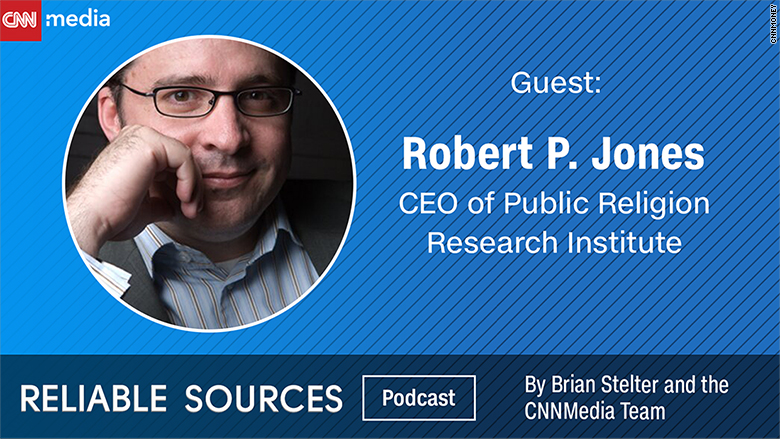
Imagining America as a dining room table, there was a time when white Christians felt entitled to the patriarch's chair -- the one with armrests, the one that looks like a throne.
Now that the demographic composition of the U.S. is more diverse, and white Christians are no longer the majority but 43% of the population, "no one owns the table anymore," which feels "deeply unsettling to many" says Robert P. Jones, CEO of the Public Religion Research Institute and this week's guest on the Reliable Sources podcast.
Jones, who authored of "The End of White Christian America," discussed with host Brian Stelter about last weekend's violence in Charlottesville as it relates to the larger, deep-seated racial and religious tensions that have characterized the United States throughout history.
Related: Explaining Charlottesville: Did the media paint the whole picture?
The Charlottesville events can be interpreted as an extreme form of backlash to multiculturalism. At their core, they manifested "a sense of loss and nostalgia for a time gone by when white people, white Christians in particular, held unquestioned power," Jones told Stelter.
When white supremacists showed up last week at Charlottesville's Emancipation Park to protest the removal of a Robert E. Lee statue, their fear of what Jones calls "cultural replacement" was on full display when they led the crowd with chants like "You will not replace us" and "Jews will not replace us."
The sense of loss is also conveyed in President Trump's own words. Speaking from Trump Tower on Tuesday, Trump was defiant about removing Confederate monuments when he asked if it also meant that statues of other American heroes who owned slaves would have to be removed.
"So this week it's Robert E. Lee. I noticed that Stonewall Jackson's coming down. I wonder, is it George Washington next week? And is it Thomas Jefferson the week after?" Trump said. "So you know what? It's fine. You're changing history. You're changing culture."
Jones noticed the frustration in Trump's voice during that blustery press conference.
"He was exasperated," Jones said. "That exasperation, that frustration really is a way of reinterpreting history, reclaiming history that's been lost."
Jones also sees a link between America's disenfranchised white working class and Trump's November victory.
A survey of white working class Americans the PRRI ran in partnership with The Atlantic last fall showed that "the most powerful factor that made you three and a half times more likely to support Trump's candidacy was the sense of being a stranger in your own land," he told Stelter.
As the demographic and cultural makeup of the country changes, the idea of America as a melting pot where integration happened by way of assimilation to the dominant culture no longer holds. How Americans react to this evolution will test their commitment to the constitutional principle of religious freedom, Jones believes.
"What we've done in the past is we cheated a little bit," Jones said. "Every generation until this one has known that no matter how much religious diversity is out there, white protestants really control the culture."
Listen to the full podcast with Jones and Stelter here, and subscribe on iTunes.


